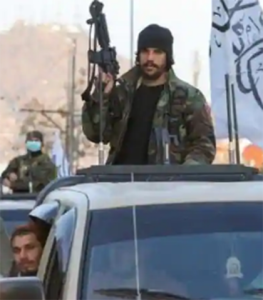Taliban executing people at will – report
Taliban forces in Afghanistan have murdered or forcibly disappeared more than a thousand former police and intelligence officers in just four provinces, according to a new report from Human Rights Watch.
The report, from the New York-based NGO says the killings and disappearances have occurred since the Taliban took over the country on August 15.
 The 25-page report titled ‘No Forgiveness for People Like You, Executions and Enforced Disappearances in Afghanistan under the Taliban,’ documents the killing or disappearance of 47 former members of the Afghan National Security Forces (ANSF) military personnel, police, intelligence service members, and militia.
The 25-page report titled ‘No Forgiveness for People Like You, Executions and Enforced Disappearances in Afghanistan under the Taliban,’ documents the killing or disappearance of 47 former members of the Afghan National Security Forces (ANSF) military personnel, police, intelligence service members, and militia.
All had surrendered to or were captured by Taliban forces between August 15 and October 31.
Human Rights Watch gathered credible information on more than 100 killings from Ghazni, Helmand, Kandahar, and Kunduz provinces alone.
“The Taliban leadership’s promised amnesty has not stopped local commanders from summarily executing or disappearing former Afghan security force members,” HRW spokesperson Patricia Gossman.
“The burden is on the Taliban to prevent further killings, hold those responsible to account, and compensate the victims’ families,” Ms Gossman said.
Human Rights Watch interviewed 67 people – mostly witnesses, relatives and friends of victims, former government officials, journalists, healthcare workers, and Taliban members.
HRW said the Taliban leadership had directed members of surrendering security force units to register to receive a letter guaranteeing their safety.
The NGO claims Taliban forces have used these screenings to detain and summarily execute or forcibly disappear people within days after they register, leaving their bodies for their relatives or communities to find.
The Taliban have also been able to access employment records that the former government left behind, using them to identify people for arrest and execution, it says.
“In just one example, in Kandahar City in late September, Taliban forces went to the home of Baz Muhammad, who had been employed by the National Directorate of Security (NDS), the former state intelligence agency, and arrested him. Relatives later found his body,” the report said.
The Taliban have also carried out abusive search operations, including night raids, to apprehend and, at times, forcibly disappear suspected former officials.
Locals says the night raids are terrifying and conducted on the pretext of disarming ex-security forces who have not surrendered weapons.
During searches, the Taliban often threaten and abuse family members to make them reveal the whereabouts of those in hiding, HRW says.
Some of those eventually apprehended have been executed or taken into custody without acknowledgment that they are being held.
The report says that the Taliban’s intelligence department in Helmand detained Abdul Raziq, a former provincial military officer, after he had surrendered in late August. Since then, his family has been unable to find out where he is being held, or if he is still alive.
The executions and disappearances have generated fear among former government officials and others who might have believed that the Taliban takeover would bring an end to the revenge attacks that had been characteristic of Afghanistan’s long armed conflict, the report says.
Many of those killed have been targeted because of their Salafist views, or their particular tribal affiliations.
On September 21 the Taliban announced the establishment of a commission to investigate reports of human rights abuses, corruption, theft, and other crimes. The commission has not announced any investigations into any reported killings, although it did report on the arrest of several Taliban members for stealing, and the dismissal of others for corruption.
In a response to the HRW report, the Taliban said that they have dismissed those responsible for abuses but provided no information to corroborate their claim.
“The Taliban’s unsupported claims that they will act to prevent abuses and hold abusers to account appears, so far, to be nothing more than a public relations stunt,” Ms Gossman said.
“The lack of accountability makes clear the need for continued UN scrutiny of Afghanistan’s human rights situation, including robust monitoring, investigations, and public reporting.”
Former Afghan trauma surgeon Abdulatif Stanikzai has spent a decade fleeing the Taliban, since three fatally injured terrorists died in his hospital.
Months later, other terrorists killed his father, uncle and other relatives. Abdul has also been shot and stabbed several times. Fearing ongoing attacks – and to protect his fiancé, mother and siblings – Abdul escaped to Dubai then to Indonesia before moving to Australia as a refugee in 2019.
When the Taliban took control of Kabul on August 14, his family was forced to flee their home. Several members of his family have disappeared and are thought to be captives of the Taliban; and he believes three more are in hiding, but he has had no contact with any of them for more than a month.
“I don’t know where any of my family is now and I fear for them,” Dr Stanikzai said.
Read the full report: https://www.hrw.org/report/2021/11/30/no-forgiveness-people-you/executions-and-enforced-disappearances-afghanistan












